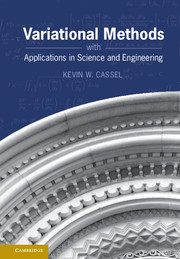10 - Optimization and Control
from PART III - OPTIMIZATION
Published online by Cambridge University Press: 05 July 2013
Summary
Catbert: Wally, you can't float through life with no goals and no ambition. Wally: You misjudge me. I have my entire career planned out. My five-year plan is to avoid any sort of work in which my individual accomplishments can be measured. I'll hoard knowledge about one of our legacy systems so I seem indispensable. When I get to within four years of retirement, I'll only work on projects that have a five-year payback. I'll protect my cardiovascular system by getting plenty of naps and not caring about the quality of my work. Then I'll stick a straw in our pension fund and suck on it for the next forty years.
(Dilbert Comic by Scott Adams)The focus of Chapters 4 through 9 has been to develop physical variational principles and their associated differential equations of mathematical physics. The number and variety of physical phenomena captured in Hamilton's principle are truly remarkable and are a testament to the fundamental nature of the law of conservation of energy on which it is based. Whereas our emphasis has been to elucidate the laws of physics using calculus of variations, we now turn our attention to optimization and control of these systems. Interestingly, the same variational methods used to formulate the governing Euler equations provide the framework for performing their optimization and control. The governing Euler-Lagrange equations of motion obtained in the previous chapters become the differential constraints for control of such dynamical, fluid mechanical, and electromagnetic systems.
Information
- Type
- Chapter
- Information
- Variational Methods with Applications in Science and Engineering , pp. 303 - 360Publisher: Cambridge University PressPrint publication year: 2013
